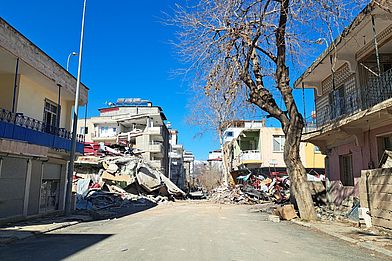The earthquakes at the beginning of February shook the Syrian-Turkish border region to an almost incomprehensible extent. Tens of thousands of people died, many millions were left homeless, and countless livelihoods were destroyed. While many of the consequences are not yet foreseeable, it has long been clear that the catastrophe is more than a force of nature - it is deeply political.
People were literally buried under the irresponsibility of state authorities and construction companies. The regions affected are those in which people already live under the most adverse conditions in the face of oppression, war and displacement.
The right to aid is not divisible. But this quake shows more than ever that it is being used as a political tool. Governments in Turkey and Syria are trying to determine where assistance will arrive and under what conditions - and where it will not. The international community appears helpless at best. With regard to northwestern Syria, the UN itself speaks of an "international failure." It has abandoned the people.
This makes local and self-organized aid all the more important. medico has been working with partner organizations in the affected areas for many years. They were on the ground before the disaster, they are now and they will remain. This kind of help from below is what counts.
Support the emergency relief of local organisations through
Northeast Syria. The self-governing region in northeastern Syria, Rojava, has been sabotaged and attacked by Turkey for years - with military offensives, the cutting off of water supplies, and drone strikes that target and destroy civilian infrastructure. Even after the earthquake, the region remains under attack. In the acute emergency, the emergency workers of the Kurdish Red Crescent, with whom medico has been working for a long time, are securing medical care in districts of Aleppo and areas such as Kobane or Sheba. They are also setting up tent cities to house survivors.
Southeast Turkey. In the Kurdish regions, too, state aid hardly arrives - and here, too, this is no coincidence: For the AKP government, these are politically disagreeable regions. Instead of support, local administrations and structures have repeatedly experienced criminalization and political persecution in recent years. At present, it is largely civil society initiatives and networks that are providing emergency shelter, food, clothing and heating materials. For example, with the support of medico, volunteers travel from Diyarbakır to the destroyed villages and provinces to find out what is most urgently needed. They organize communication and supplies for survivors and the homeless.
Northwestern Syria. In Idlib, an area controlled by Islamist rebel groups with millions of internally displaced people, people have been worn down by war, displacement and neglect for years. The earthquake has done nothing to change that; on the contrary, the region remains largely sealed off, even to much-needed aid. Accordingly, there is a lack of everything, including for the rescue and medical care of the victims. Nevertheless, people on the ground are trying to provide help. Several medico partners, including the Women's Center in Idlib, are organizing emergency shelters and the distribution of essential goods for several thousand families in the region.
For years, medico international has been supporting organizations in the areas currently affected by the earthquakes. In spite of much resistance, these local partners are now providing emergency aid, also and especially where international aid can hardly reach. In addition, it is a matter of political solidarity: to assert the right to help for all; and to create prospects for people who have lost everything - whether locally or here. For both, they need our support.
Support the emergency aid of local organizations in the region with
Berlinale statement
Become a medico sustaining member
Change needs solidarity and staying power. A sustaining membership makes it possible to enter into long-term and binding cooperations with your regular contributions. It helps to support partners in regions that are not in the focus of public attention and to help in crisis situations even when sympathy and willingness to donate dwindle. Your supporting membership creates the basis for partnerships based on solidarity.
Audited and recommended

medico international is a bearer of the "DZI donation seal". The German Central Institute for Social Issues (DZI) certifies medico's careful and responsible handling of donations and an appropriate share of advertising and administrative costs. A control of the association and its organs is given.


